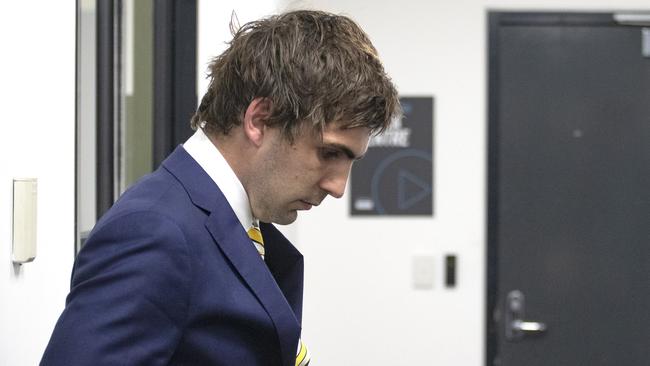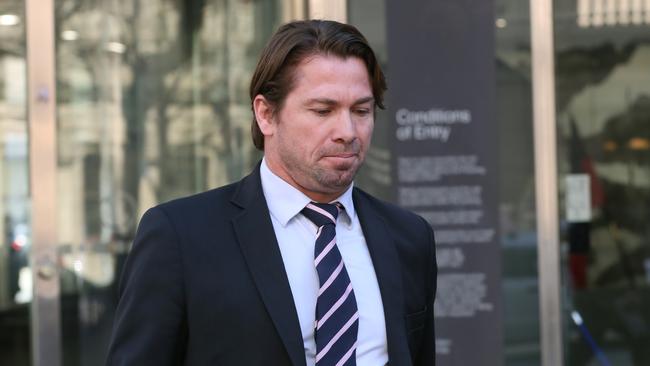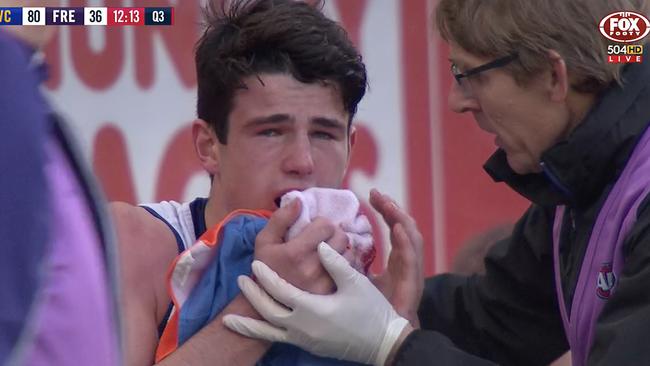David Penberthy: The great footy violence double standard
A DEEPLY remorseful footballer rightly gets a career-shattering penalty for an out of character act, while a former player and repeat domestic abuser escapes jail. It doesn’t stack up, writes David Penberthy.
THERE were two cases this week involving high-profile footballers that go to the heart of issues of intense community concern — coward-punch violence and domestic violence.
The first involved a good man who made one shocking mistake and paid a serious price at great cost to his career.
The second involved a man of dubious character who repeated his mistakes over and over, three times in fact, but who in a legal sense suffered no real life-altering penalty.
Both cases involved issues where the authorities were expected to “send a signal” — to use the term of the times — about community standards.
In the first case, that job fell to the AFL as it deliberated on West Coast star Andrew Gaff’s sickening head punch to Fremantle’s Andrew Brayshaw, who will spend the rest of the year drinking through a straw and may have four dead teeth arising from his shattered jaw.
Despite the fact Gaff is universally regarded as an excellent bloke with no history of violence — not even a fine, let alone a suspension — the AFL decided, rightly, that his good character could not eclipse the magnitude of what he did.
His eight-week ban renders him ineligible for AFL’s best and fairest award, the Brownlow (which he might have won); it rules him out of the finals and also the Grand Final (which his team might win); and casts a continuing pall of shame over his pre-season as it follows him into the 2019 football calendar.
This is a serious penalty.

This same week, Victoria’s County Court was deliberating on an appeal brought by a star from yesteryear, North Melbourne 300-gamer Shannon Grant, a Norm Smith medallist voted best afield in his club’s 1999 AFL Grand Final win.
Whatever greatness Grant achieved as an athlete has not been matched off the field. He sounds like an ordinary sort of a person, a man unable to control his drink, and who repeatedly thought that belting his girlfriend was an acceptable way of dealing with domestic pressures. Sure, he pleaded guilty, and is finally getting help, but in the good bloke stakes he has a lot of catching up to do.
Grant had been sentenced to six months’ jail over three separate assaults on his former girlfriend. At one point she was so badly bruised that she didn’t leave the house for a fortnight.
In each case Grant was in a fit of drunken jealousy, angrily trying to access his partner’s phone to check her messages. In the first altercation he slammed her on to the floor and cut her eye; in the second he shoved her in the chest; in the third he wrestled her in a hotel bathroom and stomped on her with his feet, bruising her foot, hip, elbow and hand.
“I regard it of particular concern that it took three serious incidents to bring you to the realisation of the harm you were doing and the need to change your conduct,” Judge Susan Cohen told Grant during the appeal this week.

Despite this even-handed assessment of Grant’s brutish conduct, the judge then set aside his six-month jail term and handed him a very generous two-year community order. No jail time at all, just a cruisy 200 hours of community work.
Grant’s partner might have been belted three times but Grant himself has been kissed on the backside by a rainbow.
In her reasoning, the judge used a form of words which I suspect many people — especially women, and especially women who have been beaten — would regard as concerning.
She said Grant’s assaults reflected a “loss of control” rather than “deliberate aggressiveness”, and were also fuelled by his use of alcohol.
There are two problems with this.
The first is it buys into the “brain fade” argument — an argument similar to that put by the West Coast Eagles in defending Gaff — that your mind can somehow be elsewhere when you decide to belt somebody. You don’t belt somebody by accident, especially on three occasions.
The second problem is the cop-out of bringing his drinking into the discussion. Unless it can be established Grant was tied up by a third party and had bourbon funnelled down his throat, he should be made to own his drunkenness.
These two key planks of the appeal offend the concept of personal responsibility, in which poor old drunk Granty has no real idea what he’s doing.

At a time when the community is looking for messages, it absolutely sends the wrong one.
The courts usually get it right, as evidenced by the fact most cases do not make the paper nor inflame public opinion because the sentencing is reasonable and the logic is sound.
I’m not sure what’s going on in Victoria, though. This, the state that (notoriously) gave repeat chances to the maggot who killed Jill Meagher, the same state that last week gave bail to coward-puncher Ryan Wells, and that this week rolled out a convicted one-punch killer Andrew Lee as a celebrity speaker for legal studies school students visiting prison.
In that last case, the Andrews Government didn’t even tell the families of the dead kid that the bloke who killed him was strutting his stuff as some kind of anti-violence poster boy.
Andrew Lee is just one year into an eight-year jail term — one year. It’s not long in the hall of mirrors but his rehabilitation is apparently complete.
Meanwhile, in Perth, a decent bloke who did one terrible thing has had his brilliant career turned upside down.
I’m certainly not saying that Gaff didn’t deserve that penalty. But it is eight weeks longer than anything handed down to Shannon Grant who, unlike the immediately remorseful Gaff, didn’t take any steps to realise and rectify his shocking conduct until his third offence.
